FOCUS
ON SAVING UNIQUE ENDANGERED SPECIES IN KAKHETI
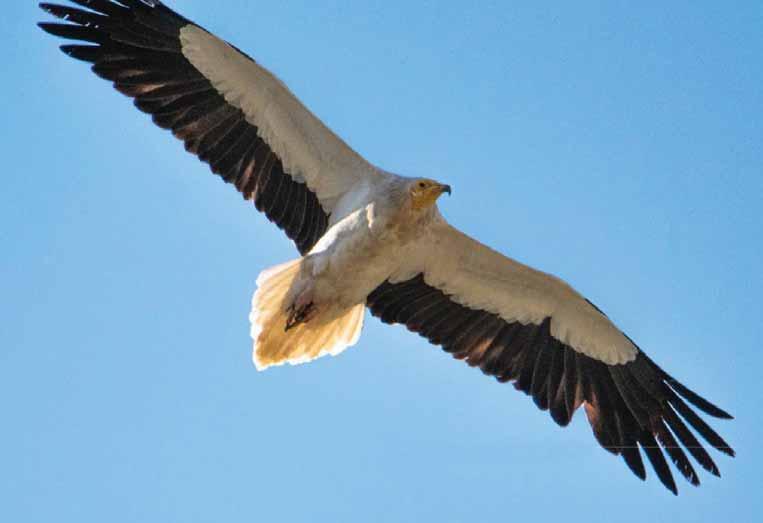
PAGE 9
Prof. Nikolas Gvosdev on the Vilnius Summit and NATO’s “Hobbit Diplomacy”
INTERVIEW BY VAZHA TAVBERIDZE
Last week, Radio Free Europe's Georgian Service sat down with Prof. Nikolas Gvosdev, a Russian-American international relations scholar, to discuss the outcomes of the NATO summit in Vilnius for Ukraine and Georgia.
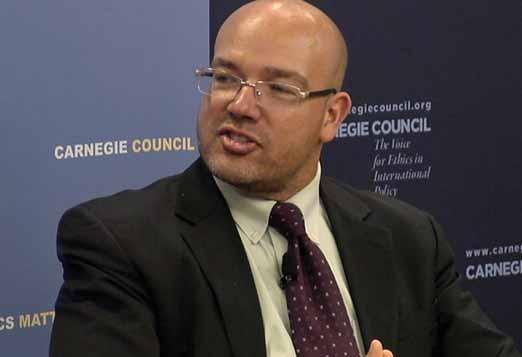
SOME DUBBED THE SUMMIT AS “BUCHAREST REVISITED.” IS THAT A JUSTIFIABLE MONIKER?

In some ways, it was worse, because by keeping the Membership Action Plan requirements, Ukraine would have an understanding of what it would need to fulfill. Now, we have this very vague formulation that doesn't give us a lot of clarity as to what the conditions are, when they should be met, or who will evaluate if those conditions have been met. So in some ways, this summit worsened Ukraine's position in that Ukraine doesn't have a clear invitation and it doesn't have a timeline.
In this week’s issue...
Ukraine Updates: Kyiv Faces 6th Attack This Month, Zelensky Says Ukraine Grain Export Ban ‘Unacceptable’
NEWS PAGE 2
Political Shifts among Opposition Parties
NEWS PAGE 3
Andrei Zorin on the Worth of Russian Literature in Today’s Academic Studies
POLITICS PAGE 4
The Greater Black Sea Region in the Contemporary Context: A Frank Conversation. Part 1
POLITICS PAGE 6
Legal Insights with Klein Law: Buying a Secondhand Flat in Georgia
BUSINESS PAGE 7
Demand Exceeded All Expectations – “Tsavkisi Panorama” Project is Being Completed One Year Earlier
SOCIETY PAGE 8
Systematic Land Registration Explained
SOCIETY PAGE 10
UNESCO Strongly Condemns Repeated Attacks on Cultural Heritage
CULTURE PAGE 11
Issue no: 1409 • • JULY 28 - AUGUST 3, 2023 • • PUBLISHED WEEKLY
PRICE: GEL 2.50
Continued on page 5
The Kakheti Steppes project - protecting habitats and floodplains through targeted conservation measures
Prof. Nikolas Gvosdev. Source: Carnegie Council
Ukraine Updates: Kyiv Faces 6th Attack This Month, Zelensky Says Ukraine Grain Export Ban ‘Unacceptable’
COMPILED BY ANA DUMBADZE
Russian officials accused Ukrainian forces of attempting an overnight airstrike against Crimea this week, with Moscow claiming it used anti-drone equipment to foil the attack.
The Russian defense ministry wrote on Telegram that a total of 17 drones were used to target the peninsula, and that there were no casualties.
Russia’s state-owned news agency Tass reported that debris was found close to the Russian ministry of defense building.
Kyiv officials have not publicly acknowledged the attack, which came the day after a Russian strike on the Ukrainian port city of Odesa.

In response to the aggression in Odesa, President Volodymyr Zelensky had tweeted Sunday morning, “There will definitely be a retaliation on the Russian terrorists for Odesa. They will feel this retaliation.”
That was a reference to days of Russian missile strikes against targets in the port city, which Moscow says are payback for a Ukrainian attack last week on the Crimean Bridge which killed the parents of a 14-year-old girl.
Kyiv faced its sixth air attack this month early Tuesday, the Kyiv City Military Administration wrote on Telegram, but all drones were detected and destroyed “in a timely manner.”
There were no casualties and the city was not damaged, KCMA head Serhiy Popko wrote.
The attack follows a string of airstrikes on Ukraine, including the demolition of a significant cathedral in Odesa on Sunday, which Russia attributed to Ukrainian rockets, and a four-hour Russian drone attack against port infrastructure along the Danube River early on Monday.
ZELENSKY SAYS UKRAINE IS FOCUSING ON DEFENDING AGAINST RUSSIAN DRONE STRIKES IN PORT CITIES
Ukrainian President Volodymyr Zelensky said that his country’s forces are bracing for Russian drone attacks.
“Our focus is on safeguarding our people, cities, ports, and the Black Sea grain corridor. Robust responses to attacks by Russian terrorists are being prepared to
maintain our security and protect our interests,” Zelensky wrote on his official Telegram channel.
“In all directions, our primary task is to inflict maximum damage on the occupiers, targeting their equipment, supplies, warehouses, and headquarters. Ensuring that Russia suffers losses every day is a just goal,” Zelensky added.
In recent days, Russian forces have carried out punishing drone strikes on port cities, like Odesa.
ZELENSKY: UKRAINE GRAIN EXPORT BAN ‘UNACCEPTABLE’
External forces have continued to urge Russia to return to the Black Sea Grain Initiative, which it abandoned on July 17, prompting a surge in wheat prices.
“With the termination of the Black Sea Initiative, the most vulnerable will pay the highest price,” UN Secretary-General Antonio Guterres told the UN food summit on Tuesday. “As food prices rise, the hopes of developing countries fall.”
The Kremlin, meanwhile, has said a return to the deal is currently impossible, according to Google-translated comments carried by Russian state news agency Tass on Telegram.
President Volodymyr Zelensky called on the European Union on Monday to ensure that an "unacceptable and clearly non-European" ban on Ukrainian grain imports to five countries is lifted by a Sept. 15 deadline.
The five central European countries want the EU ban extended at least until the end of the year. The ban is set to expire on Sept. 15.
In his nightly video address, delivered after a meeting with government officials, Zelensky said there could be no question of extending the restrictions beyond the deadline.
"We believe that the European side will fulfill its obligations regarding this date, when the temporary restrictions will cease to apply," Zelensky said.
"Any extension of these restrictions is entirely unacceptable and clearly unEuropean. Europe has the institutional capacity to act more rationally than closing this or that border to this or that type of good."
Ukraine, he said, was "actively working with everyone to find a solution that is in line with the spirit of our Europe".
The president had earlier written on Telegram that any extension was "unacceptable in any form".
The EU in May allowed Bulgaria, Hungary, Poland, Romania and Slovakia to ban domestic sales of Ukrainian wheat, maize, rapeseed and sunflower seeds, while permitting transit of such cargoes for export elsewhere.
The countries include some of Kyiv's staunchest diplomatic supporters in its war against Moscow, but they say inflows of Ukrainian grain have hurt their farming sectors.
EU and FAO Launch the First Support Cycle Targeting Food Business Operators
Through the support of the European Union under ENPARD IV, the Food and Agriculture Organization (FAO) of the United Nations has launched the first support opportunity for Food Business Operators (FBOs), which have benefitted from ENPARD I, II, or III. The support package will include technical assistance and a matching grant opportunity to improve the food safety standards in compliance with the food safety legislation.
FAO has already reached out to the eligible beneficiaries with an offer of participation in the program. In total, 85 candidate FBOs have expressed interest, and the FAO team is currently defining an action plan for each participant with them.
The first phase of the EU-funded sup-
port cycle will ensure that the benefiting FBO representatives are trained on food safety. They will have the opportunity to learn about the topic from international and national FAO experts. Furthermore, the FBOs, which still need the HACCP plan, will be supported to develop it.
After this training, FAO will assess the equipment needs of each beneficiary to reach food safety standards. Based on the assessments, EU-funded matching grants will be offered for purchasing the identified equipment.
The maximum amount of the EUfunded matching grants will be up to USD 50 000, and FAO will cover up to 70 per cent of the costs of the identified equipment.
“The partnership of FAO and the EU in Georgia through ENPARD has created thousands of opportunities for
farmers through educational modules, technical assistance, and, of course, the matching grant mechanisms,” says Javier Sanz Alvarez, the FAO Program Coordinator. We are launching the first support cycle under ENPARD IV, working with previous ENPARD beneficiaries to enhance food safety measures in their facilities, but also to increase their competitiveness on national and international markets. Georgian consumers deserve the best food safety standards, following the EU model.”
Under the EU-funded ENPARD IV, FAO will gradually launch various support packages consisting of technical assistance and matching grants to address some of Georgian agriculture’s most pressing food safety challenges.
The European Union supports rural development in Georgia through its
in October, Reuters reports.
The Biden administration has reiterated that Beijing should not assist Moscow as Washington and its Western allies coordinate rounds of sanctions for the Kremlin’s ongoing war in Ukraine.
US APPROVES SECURITY PACKAGE WORTH $400 MILLION FOR UKRAINE
The Biden administration approved a new security assistance package for Ukraine worth $400 million.
“The people of Ukraine continue to bravely defend their country against Russia’s aggression while Russia continues its relentless and vicious attacks that are killing Ukrainian civilians and destroying civil infrastructure,” Secretary of State Antony Blinken wrote in a release announcing the arms package.
The weapons included in the latest package are:
Poland will not lift the ban on Sept. 15, even if the EU does not agree on its extension, its prime minister said last week.
RUSSIAN RETURN TO UKRAINE GRAIN DEAL CURRENTLY IMPOSSIBLE, KREMLIN SPOKESPERSON SAYS
A Russian return to the Black Sea grain deal is currently impossible, as Moscow’s demands have not been met, Kremlin spokesperson Dmitry Peskov said in Google-translated comments carried by Russian state news agency Tass on Telegram.
Russia pulled out of the agreement — which allowed the safe passage of Ukraine grains to global markets during wartime — on July 17, citing ongoing restrictions on its own fertilizer and agricultural goods.
Western nations have widely criticized the decision, with the UN entreating Moscow to reconsider and Turkish President Recep Tayyip Erdogan, saying he would seek to bring his Russian counterpart Vladimir Putin back to the negotiation table.
PUTIN EXPECTED TO VISIT CHINA IN OCTOBER, KREMLIN SAYS
The Kremlin said Russian President Vladimir Putin was invited and plans to attend the Belt and Road forum in China
Additional munitions for Patriot air defense systems and National Advanced Surface-to-Air Missile Systems, or NASAMS; Stinger anti-aircraft systems; Additional ammunition for High Mobility Artillery Rocket Systems, or HIMARS; 155mm and 105mm artillery rounds; 120mm and 60mm mortar rounds; 32 Stryker armored personnel carriers; Tube-Launched, Optically-Tracked, Wire-Guided or TOW missiles; Javelin and other anti-armor systems and rockets; Hornet unmanned aerial systems; Hydra-70 aircraft rockets; Tactical air navigation systems; Demolitions munitions for obstacle clearing; Over 28 million rounds of small arms ammunition and grenades; Night vision devices and thermal imagery systems and Spare parts, training munitions and other field equipment.
RUSSIA SAYS ITS BLACK SEA FLEET SHIPS DESTROYED TWO UKRAINIAN NAVAL DRONES
Ukrainian forces attempted to attack two Russian naval patrol ships in the Black Sea Tuesday night, according to Russia’s Defense Ministry.
“Tonight, the Armed Forces of Ukraine made an unsuccessful attempt to attack the Black Sea Fleet’s Sergei Kotov patrol ship, which is carrying out tasks to control navigation in the southwestern part of the Black Sea (370 km southwest of Sevastopol),” the ministry said, as reported by state-owned news agency Tass.
The ministry said there were no casualties.
ENPARD Program. Aiming to reduce rural poverty, ENPARD has been implemented since 2013. The Program started by supporting the development of national agriculture potential. Afterwards, it concentrated also on creating economic opportunities for rural pop-
ulations in Georgia. Since 2021, the program has placed an even more significant emphasis on improving food safety in the country, with the support of FAO and the Czech Development Agency as main implementers of the ENPARD IV program.

GEORGIA TODAY JULY 28 - AUGUST 3, 2023 2 NEWS
Image source: Anadolu Agency | Getty Images
Image source: euneighbourseast
Residential Property Price Goes up in Georgia
TI: Since Ukraine
In the second quarter of 2023, the Residential Property Price Index (RPPI) in Georgia increased by 3.0 percent compared to the previous quarter, while the annual increase amounted to 13.1%, the Georgian National Statistics Service (GeoStat) reported.

Compared to the 2020 average, the index change amounted to 28.8%. The RPPI covers the market of new residential property in Tbilisi, both the flats and detached houses segments.
In the second quarter of 2023, a price increase, compared to the previous quarter, was registered both in flats (3.4%)
and detached houses (1.6%) segments.
Compared to the second quarter of 2022, the prices increased in both segments, for flats by 10.6% and for detached houses by 16.2%.
In Tbilisi, residential property prices rose the highest in Mtatsminda, Vake, Krtsanisi, and Saburtalo.
Political Shifts among Opposition Parties
BY TEAM GT
National Movement and Strategy Builder said this week they will continue their political activities with a united composition. The leaders of the mentioned parties - Levan Khabeishvili and Giorgi Vashadze - announced their political unification at a joint press conference held in Radisson.
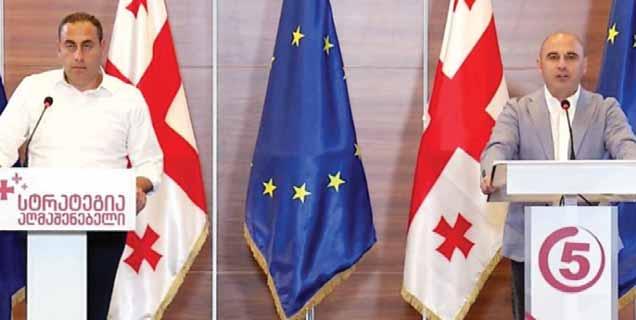
Khabeishvili noted that, together with Strategy Builder, they will develop a common strategy to defeat the Russian party and Bidzina Ivanishvili.
According to Khabeishvili, a winning platform should be created on the basis of pro-Western parties.
"The National Movement is the largest European party and we, of course, made a concrete decision to create a winning platform on the basis of pro-Western
parties. After specific consultations, we reached an agreement with the party, which, according to research, is also the largest among all pro-Western parties: Strategy Builder.
“With Strategy Builder, we will have a common strategy to defeat the Russian party [Georgian Dream] and Bidzina Ivanishvili. I would like to thank Strategy Builder and each member of its team.
Mikheil Saakashvili's party, a responsible party, obviously could not have done otherwise. We have taken a concrete step and will continue to fight for a free, united Georgia," said Khabeishvili.
“Our position is clear and simple - we are not going to unite with any party, and especially with the National Movement, said Mikheil Daushvili, a member of the For Georgia party, noted after the abovementioned announcement.
He added that the statement that the formula for the defeat of the Georgian Dream is the union of National Movement and Strategy Builder does not con-
vince him.
“Who will unite with whom and how, it's their business. What will be productive and what counterproductive, the elections will ultimately show us. I don't believe that this is the formula for the defeat of Georgian Dream. In general, I don't want to go into the depths - divided, returned, then divided again, then returned again. Our decision is clear: we are not going to unite in any way,” Daushvili said.
At the same time, Daushvili responded to Eka Beselia's statement that the former members of Georgian Dream might unite, and consultations are ongoing with Giorgi Gakharia. Daushvili states that he has no information about such consultations.
"I don't have any information about these consultations. I don't know which former members are planning what union. Maybe some people are talking about unions or cooperation with others, but I don't have any information about it," Daushvili said.
War,
Russian Citizens Founded 21,326 Companies in Georgia

After the start of the war in Ukraine, Russian citizens founded 21,326 companies in Georgia, which is three times more than the previous 27-year figure, Transparency International Georgia reports.
In particular, according to the organization, from January 1995 to February
2022, 7,788 companies were founded by Russian citizens in Georgia, and from March 2022 to June 2023, this number tripled.
Accordingly, according to the organization’s data, after the start of the war in Ukraine, Russian citizens register an average of 1,300 companies per month in Georgia.
Middle East Airlines Expands into Georgian Air Market with Charter Flights
 BY MARIAM GORKHELASHVILI
BY MARIAM GORKHELASHVILI
Middle East Airlines (MEA), the national carrier of Lebanon, is making its foray into the Georgian air market with a strategic move. After assessing the potential of the route, the airline has commenced 10 charter flights on the Beirut-Tbilisi-Beirut air route. Depending on the response and demand from passengers, MEA will determine whether to continue operating regular flights on this route in the future. This decision comes after MEA’s successful operations in Armenia, where it runs three weekly flights with high passenger traffic.
The first charter flight from Beirut to Georgia took place on July 19, with MEA achieving a commendable 75% load factor. After this, the airline operated a second flight, which recorded a satisfactory 45% load factor. Considering that MEA did not carry out an open marketing campaign for these initial flights, these numbers bode well for the airline’s prospects in the new market.
The motivation behind launching direct flights between Beirut and Tbilisi stemmed from the influx of passengers traveling from Beirut to Georgia through
various indirect routes and airlines. With significant demand for this route, MEA decided to step in and offer direct connectivity to meet the needs of travelers.
Facilitating MEA’s operations in Georgia is “Sidon Travel,” which not only represents the airline effectively but also serves as its General Sales Agent (GSA) in the region. This strategic partnership will aid in capturing a sizeable share of the market.
MEA has a rich history, dating back to its establishment in 1945, and made its inaugural flight a year later in 1946. The airline’s base at Beirut Rafik Hariri International Airport positions it as a key player in international air travel, serving destinations across Asia, Europe, and Africa.
Over the years, MEA has expanded its horizons by becoming a member of the esteemed SkyTeam aviation alliance, as well as joining the International Air Transport Association (IATA) and the Arab Air Carriers Organization.
As MEA ventures into the Georgian market, all eyes are on the success of its charter flights. Depending on the outcomes and passenger response, the airline will soon decide on the future of regular flights on the Beirut-Tbilisi route, solidifying its presence in the region and providing a valuable service to travelers.
GEORGIA TODAY JULY 28 AUGUST 3, 2023 3 NEWS
Why Vote If There Is No Gain In It?

back of his mind), but will do this with a smattering of cynical deliberation: Why am I doing this? I am spending time and taking pains, but I am not making any fiscal progress here. Nobody does, but they are not aware of the inner pecuniary crux of elections as such. The process is devoid of any economic advantage. It is only packed with political suppositions that might turn out to be wrong or right, fifty-fifty. The entire electoral marathon, taking place within an extremely intricate technical and behavioral network, purports only a chance (No certainty!) of making a political choice, and that faithfully-made choice has the potential to yield a disastrous result. Such political fruits have many times been harvested in this country in those postsoviet apprehensive decades. Why would an economist hit the voting booth with bigger doubts and idiosyncratic qualms than a regular voter? Because an economist is better versed in the arithmetical means and ways the nations operate to feed their populations.
thought utterly entertaining?
The time of election fever is approaching our edgy and oversensitive society; its inner political mainspring tightening and ready to trigger massive hypertonic and cardiovascular excesses in our everyday life, which in principle sees us asking simply for more bread-and-butter than ideo-
logical nourishment. The more or less educated voters, especially the ones who are well-versed in matters economic, may wonder if they should go and cast their not-particularlyappreciated vote at all, spending time, nerve and energy on something that will never kick back in any rewarding way. We vote because voting is a traditional socio-political obligation; a civic duty driven by a certain democratic predisposition; an undying instinct, if you wish, that we could certainly live without, but
which the dictate of our public conscience urges us to do nonetheless. People vote with an overblown conviction that their vote matters. That’s why they try not to miss the opportunity to cast their votes at that responsible instant, if only so some funny dude gets elected to grab the reins of ruling the nation. Economists, however, know better what they are doing and why. A strong economic expert might of course go to a polling station (he too has a civic duty in his heart of hearts and at the
I have read a couple of American authors in the economic field, among them Levitt & Dubner, who confidently maintain that an economist knows quite well that voting involves costs like time, effort, money and even lost productivity, with no discernable payoff except a vague sense of the diligently performed civic onus. I can’t help quoting Patricia Funk, Full Professor of Economics at Università della Svizzera Italiana, who commented in one of her papers almost two decades ago that a rational individual should abstain from voting. Isn’t this
If we continue listening to the arguments put out by the above-mentioned eccentrically thinking economic gurus, we will hear that the odds are in favor of our vote being unlikely to affect the outcome of any given election. Notwithstanding their obstinate presumption, hundreds of millions in the world hurry to give their vote, among them our Georgian electors, in the strong belief that they can make a difference. On the other hand, they might have reason to act that way. Once again, I would like to allude to the research by Levitt & Dubner, who would not hesitate to suggest the following as corroboration of those reasons: firstly, we, the contemporary voters, might not be astute enough to believe that our vote has no power to affect the voting consequence; secondly, we might not be smart enough to discern between elections and the lottery, which is a bad investment; and, thirdly, we might be strongly convinced that voting is our inevitable civic duty that has to be executed whether we want it or not, so that we don’t find ourselves guilty for not having voted.
Now, imagine if all of us thought the way the economists do, there might not even be such a thing as elections. So what to do? Nothing looms as yet on the horizon more practicable than our old and long-approbated democratic ways, whether good or bad. But the general progress of Mankind is still ongoing, and the invention of some smarter things might still be in store for all of us to enjoy someday in the future. Hopefully in the foreseeable one!
Andrei Zorin on the Worth of Russian Literature in Today’s Academic Studies
INTERVIEW BY VAZHA TAVBERIDZE

Radio Free Europe’s Georgian Service sat down with Andrei Zorin, Professor and Chair of Russian of the University of Oxford and Fellow of New College to discuss the Ukraine war and the “soul-searching” that seems to be going on in European universities and among scholars that teach and research Russia.
“This horrifying war in a way coincided with a major wave in Western academia, which much preceded the war: the socalled decolonization tradition that claims it is wrong to concentrate on the center or the empire without seeing the socalled peripheries, without paying attention to the subjectivity of the people around, and so on and so forth,” Zorin tells us. “And the general argument is that we should decolonize Russian studies; we should concentrate more on the former peripheries of the empire. And it makes a lot of sense, actually, unless you overdo it in the other direction. And there are a lot of risks in it, because you can't study the imperial legacy without studying the center.”
ARE YOU ALLUDING TO THE ONGOING MOMENTUM SPEARHEADED BY UKRAINIANS TO REEVALUATE SOME OF THE RUSSIAN CLASSICS FROM THE POST-COLONIAL AND POST-IMPERIAL PRISM (PUSHKIN, LERMONTOV AND DOSTOEVSKY SEEM TO BE THE THREE MAIN OFFENDERS)?
It is understandable, yes. Because, especially in the former Soviet republics, Russian literature was seen as a part of the imperial power, and when monuments to Pushkin are torn down in Ukraine, it’s not so much about his poetry, and I think it would be very wrong to
equate the way this or that writer was used with the actual legacy. Of course, there were a lot of imperial motives in Pushkin's poetry, there’s no denying it. But at the same time, this is the face of empire. And it's absolutely not unique to the Russian Empire.
THE ARGUMENT IS THAT HE WAS A PRODUCT OF HIS TIME, THEN?
Historically, major poets do identify themselves with their countries. Can we start blaming Shakespeare for not recognizing Scotland, and say everything good in Macbeth comes from England?
Lermontov was very ambivalent. He saw this expansion of empire as inevitable, and he wrote that it was inevitable, but at the same time, he saw it as dangerous to human freedom. We can analyze his attitude to the annexation of Georgia in Mtsiri, which is deeply ambivalent. On one hand, he says, “we did protect it.” But at the same time, they're captured.
“Za Graniu Druzheskix Shtikov” – behind friendly bayonets. And this probably produced security, but was hostile to freedom, dignity. He is also extremely ambivalent about imperial expansion. Tolstoy, though, is absolutely unambivalent: he is adamantly against it.
ON LERMONTOV, I THINK
IT’S THE “BEZHALI ROBKIE GRUZHINI” (“THE COWARDLY GEORGIANS FLED”) THAT IRKS GEORGIANS THE MOST.
I can tell you a funny story. I remember being told by my father that he was at a dinner with a lot of wine in Moscow, where Georgian writer Otar Chkheidze was present, and he had to leave, and he stood up from the table, and somebody jokingly said to him: Bezhali Robkie Gruzini, to which he immediately answered: “Proshay, Nemitaya Rossia,” using another quote from Lermontov to beat the first. The Georgians, according to Lermontov, came voluntarily into
Russia's fold, so it became Russia’s duty to protect Georgia. But at the same time, it's not a compliment. The Chechens didn't come voluntarily. “They're going to be crushed. But they are heroic.” And his view of the imperial expansion is very mixed, difficult, and needs untangling. Pushkin was more benevolent about it, which I would not blame him for. But in the next generation, Lermontov, of course, had first hand experience, unlike Pushkin, participating in the war. And then in the next generation we had Tolstoy, who was powerfully against any imperial expansion. So you can't bring all Russian literature into this field and say it is purely imperialistic.
RUSSIA DOES NOT SEE UKRAINE AS A BROTHER BUT AS ONE WHOLE, PART OF ITS ONE BODY. HOW IS GEORGIA SEEN IN THAT REGARD?
It might sound mildly surprising, maybe not, as Ukrainians and Belarusians were
never recognized as different. They were part of a major community. Georgians, I would say, were considered to be number two in importance within the popular and official mindset. Within the family of Russia nations, of course, you would never consider Georgians as being Russians. But you know very well, in the iconic photo of the most important event in national memory - the putting of the red flag on the Reichstag, there are two people: one of them was Russian, the other one is Georgian. To what extent it was dependent on Stalin being Georgian, I'm not sure. From the first point of view, Georgians were considered at least not to have been conquered, but to have willingly joined. Secondly, they were Orthodox. Yet, they are distinctly nonRussian, which allows for this feminine reunion. I think the main attitude was definitely very paternalistic, but at the same time, that is, if you use this family metaphor of brotherly nations, Georgia is the favorite of the junior brothers.
HAS IT REMAINED THE SAME SINCE THE FALL OF THE SOVIET UNION AND SINCE THE TWO WARS IN THE 1990S AND THE ONE IN 2008?
There was a lot of resentment around the war in 2008 and, for a while, it seemed that it was basically over. But this is the long held pattern. And now, those people would again say, “what do they want? Why are they unhappy? Yeah, we were also nice. We also have many Georgian friends. I've been there and was treated to excellent wine and barbecue,” and so on.
IT’S POLITICIANS WHO ARE “MUTIAT VODU,” THEN –STIRRING THE WATER.
Yes. That would be the general attitude. It will always be paternalistic. They will never consider Georgia an equal. “We are the Great Imperial nation, they are the small, but they're nice.”
GEORGIA TODAY JULY 28 - AUGUST 3, 2023 4 POLITICS
Image source: ft
OP-ED BY NUGZAR B. RUHADZE
Andrei Zorin. Source: Radio Free Europe
Prof. Nikolas Gvosdev on the Vilnius Summit and NATO’s “Hobbit Diplomacy”
Continued from page 1
COULD ONE ARGUE THAT THESE HALF MEASURES SERVE AS AN INCENTIVE FOR THE KREMLIN TO NEVER END THE WAR?
Precisely. With so many Western leaders coming into Vilnius saying, “Ukraine is only in when the war is over,” then you've signaled to Moscow that the war can continue. This is why the Korea precedent is so important. Technically, there is still a state of war on the Korean peninsula, though there are not active military operations every day. They essentially signaled to Moscow, “don't settle, just keep this going.” The Russians have shown they can sustain a level of operations in Ukraine, and continue to wreck Ukraine in a way that makes the bill for reconstruction go up and up, and so as to make Ukraine even less attractive as a partner 2-3-4 years down the road.
DOES NATO REALLY HAVE AN OPEN DOOR POLICY?
It's an open door policy where, in many cases, NATO countries are very, very eager for people not to voluntarily cross the threshold. And so, yes, the door is open, but “please, it'd be really wonderful if you didn't actually take us up on it,” particularly with regards Ukraine and Georgia. What we've seen in Georgia is some politicians saying, “fine, if we're not going to come in, then we're not going to do any of the things you want because we know that we're not going to cross the threshold anyway.”
And this actually hits on another point from NATO speak which is important, when we hear from its members, politicians, who say Ukraine is “virtually” a member of NATO, and some have said it about Georgia. But there's no “virtual” membership. There's no such concept: there is membership and there's nonmembership.
Now the third option, which would be one which we did not see at Vilnius, is NATO could introduce the concept of associations, that the alliance has “associations” with countries - not the partnerships and the Partnership for Peace we have, but associations that would have binding guarantees and commitments. But we saw no such move in Vilnius.
POP CULTURE REFERENCES TO THE UKRAINE WAR HAVE COME FROM LORD OF THE RINGS, WITH RUSSIA PORTRAYED AS ORCS. I DON'T KNOW IF YOU'RE A FAN OF TOLKIEN’S WORK, BUT THIS VERY MUCH SOUNDS LIKE “HOBBIT POLITENESS” - WHEN THEY SAY “GOOD DAY,” AND THEY ACTUALLY MEAN “GOOD BYE.”
I think that's a great analogy: it is hobbit politeness. And it is habit politeness, because the US government wants to avoid saying no; they don't want to say to Ukraine, Georgia, Azerbaijan or Moldova, “we don't really want to bring you into NATO.” They don't want to say “no,” so instead they say “the door is open.” But it is this the hobbit approach. And it is complicated by the fact that there are people, certainly within the US government, that do want to bring these countries in; but there is enough of this reluctance that it creates this impression. It doesn't really help the countries to say “the door is open but don't come in, you're virtually a member” and then for them to be left holding the bag, as Geor-
gia was in 2008, as Ukraine was in 2014, and again, after 2022, where you get hopes and prayers, sentiment, in the case of Ukraine, certainly a lot of military equipment and financial assistance, but no guarantee that the alliance is committed to reversing the Russian invasion.
LET’S TALK ABOUT THE US RELUCTANCE. HOW MUCH A ROLE DOES UNCERTAINTY ABOUT THE UPCOMING ELECTIONS PLAY IN ALL THIS?
A great deal. It has to do with assumptions that the Biden administration made about the timeline. If you look back eight, nine months ago, the US hope was that by the time Vilnius happened, Ukraine would have made substantial gains in its counter-offensive; that they would, if not have retaken Crimea and Donbas, then at least seriously damaged the Russian position. This was supposed to then allow for a discussion at Vilnius about security guarantees for Ukraine, where the fighting would essentially be at a stalemate on terms that would be favorable to Ukraine. What you now have is a US administration that is faced with an unpleasant dichotomy, which is: if you offer security guarantees to Ukraine, including a pathway to NATO membership, you are doing so at a time when Ukraine has not succeeded in regaining control of most of its lost territory. And so you're either asking Ukraine to freeze the boundaries, the lines of control, as they exist now, or Ukraine says we need more time to engage in counter-offensive operations. But then, of course, the worry in the US is this is going to draw the US more directly into the conflict, which the Biden administration does not want on the eve of an election. The polling data in the US is quite clear: there's strong support for supporting Ukraine, but there's not a lot of support for direct US engagement or involvement in the conflict. The United States isn't going to offer security guarantees while Ukraine itself is not happy with the current disposition of forces. And alongside this, I think we're now beginning to realize that we overestimated Russia’s vulnerability to sanctions and underestimated their ability to repurpose old military equipment in Ukraine, which enables them to prolong the war.

LET’S TALK ABOUT THE GEORGIAN BACKSLIDING AND THE WEST’S VIEW OF THAT.
Georgia and Georgian politicians have agency in the choices that Georgia makes. But what they are doing is getting NATO off the hook: “Well, the Georgians don't want it, the Georgians aren't working for it, the Georgians are backsliding, so now we’re free - we haven't broken any of our promises. It's the Georgians, right?”
So this is almost saying, “Well, this is good that you have the current government, because it gets NATO countries off the hook.” I'm being very cynical about this, but why did the Obama administration not protest the elections more in 2009-2010 in Ukraine that brought Yanukovych back to the presidency? Because Yanukovych got the US off the hook with regards to NATO. If Timoshenko had won the elections and become President of Ukraine, the questions we're hearing in Vilnius today would have come a decade earlier.
If there are new elections in Georgia and a change of government, one that is committed to restarting full force Georgia's Western integration, you're going to have the same set of problems of a
NATO and EU that is unprepared to deal with it.
GEORGIA’S STANCE HAS ALSO BEEN A SUBJECT OF DEBATE. IS TBILISI BEING PRAGMATIC OR PRO-RUSSIAN?
I think they're being pragmatic, given the neighborhood Georgia is in, given the extent to which the commitments are not forthcoming. Taking steps toward Russia would be bad for Georgia, but they are without guarantees that NATO, the European Union, the United States, will be a backstop. It's hard to tell a country that you should do something that will damage your national interests in the short run, but that we are not prepared to provide guarantees for the long run. I don't find that Georgia is proRussian; I think Georgia is seeking to do things that are good for Georgia. Now, Georgians can disagree whether they're good for Georgia or not, but I don't think the starting point is a particular love of Russia; I think it's a sense of how does Georgia get out of this crisis that the Ukrainian invasion has caused? You live in a neighborhood where the Armenians and Azerbaijanis are also failing to create stability for you. You have Iran to the south, you have a Turkey that's unpredictable. Georgia needs to do things that will keep it from being drawn into problems to which other countries are not necessarily going to provide the solution. So I don't see it as pro-Russian.
The sentiment in Georgia, at least in Tbilisi that I saw, is very supportive of Ukraine. There's recognition that what Ukraine is going through is what Georgia has been through, but that right now Georgia needs to be kept out of the fighting; it needs to stay as safe as it can. And if that means that some of this is facilitating trade with Russia, allowing Georgia to be a safety valve for Russians coming out, if that's the price for keeping the pressure off Georgia, I can understand it. I think there has to be that understanding in western capitals that Georgia is in a dangerous neighborhood right now. It's always been a dangerous neighborhood, but it's particularly dan-
gerous right now. And Georgia needs to be looking out for Georgia at this point. THERE A FINE LINE BETWEEN BEING PRAGMATIC AND MAKING SO MANY CONCESSIONS THAT YOU END UP IN RUSSIA'S ORBIT, JUST AS ARMENIA DID BACK IN THE DAY. That's where statesmen and politicians have to be very careful, because a pragmatic approach can then lead you to start taking steps down the road where all of a sudden, you find yourself in an orbit that you can't break out of. Careful calibration is important. This is where the debate comes in as to what extent the current government is being reckless in adopting a pragmatic approach, but not putting in those safeguards to make sure that it doesn't pull Georgia unwillingly down. Such safeguards as no movement on anything that would compromise support for Ukraine's territorial integrity, certainly not as long as Georgia’s own territorial integrity has been violated. Safeguards like making it clear that it's not going to be business as usual. Easier said than done, but there are symbolic steps that can be taken. What we've seen in Turkey is real business relations, but not business as usual, and them saying “this will not preclude us from supporting Ukraine and NATO, supporting the idea that Crimea is Ukrainian territory. The fact that we have a business relationship with Russia is not going to lead to these other steps.”
It is problematic for Georgia, obviously, and includes domestic issues, namely, the Ukrainian government wanting to intercede for former President Saakashvili, and to see that not simply as a Georgian matter, but as a matter of bilateral relations between Georgia and Ukraine, given his joint role in both countries. I don’t think it's beneficial for the current Georgian government to allow this to continue the way it has, essentially seeing the former president in danger of dying, or his medical condition being such that it creates concerns, and having this be an irritant in Georgia's relationship with Ukraine. Because that's where
pragmatism is a thing that has the potential then to push Georgia further into the Russian orbit.
THERE ARE FEARS THAT GEORGIA WILL END UP A BARGAINING CHIP ON THE END-OF-WAR NEGOTIATING TABLE, AND THE WEST WILL SAY TO GEORGIA: YOU ARE PRO-RUSSIAN, SO YOU MIGHT AS WELL STAY WITH RUSSIA. There's always the concern that the Caucasus will get sold out. In the West, we have a long history of that. I think Georgia needs to forestall that. And it's not just a matter of from one government to the next: this is where the business community and others really need to come in to build Georgia's role in the middle corridor from China across Central Asia, across the Caspian into the Black Sea region. There is a case to be made very strongly that connecting the Euro Atlantic Indo Pacific land corridor, not just the maritime land corridor, requires a stable middle corridor. It requires that that middle court and the West have to be involved and engaged. Some might argue Georgia can be written off, because it's too far away and the current government may be perceived as too pro-Russian. That’s strategic short-sightedness on the West’s part. Georgia is integral to a Western strategy of connectivity. The northern route is closed. My prediction is that you are going to see a new wall emerging on Russia's western borders, linkages are going to be interrupted, the last linkages across Ukraine are going to disappear -gas, transit, all of that, that corridor is closed, and the corridor that runs through Iran is unstable. Georgia is integral to this east-west connectivity. And it's not about nostalgia or sentiment, it is about practicality. This is where the Georgian government's pragmatism has to also be directed to the West, to say “it's in your pragmatic business security interests that Georgia be a part of this this middle corridor that has to remain open, has to remain functional.”
GEORGIA TODAY JULY 28 AUGUST 3, 2023 5 POLITICS
Prof. Nikolas Gvosdev. Source: Carnegie Council
The Greater Black Sea Region in the Contemporary Context: A Frank Conversation. Part 1
BY VICTOR KIPIANI, GEOCASE CHAIRMAN
The greater Black Sea region has established itself as a regular issue on the agenda of current discussions on security in Eurasia. This is not surprising in light of the processes that have developed over the last decade. This issue has become more relevant due to the indirect (proxy) conflict between the great powers in Ukraine and the First World Economic War. It is a fact that the aforementioned confrontation has more clearly highlighted the importance of military-political domination over the Black Sea and the adjacent territory. The reason is that the region in which Georgia is located, in the context of renewed strategic competition, is becoming a new dividing border - a kind of "geopolitical West Berlin" (if it is not already established as such).
In addition to its importance in the context of Eurasian security as a whole, the greater Black Sea region is the gateway of critical transit routes through the South Caucasus to the Eastern Mediterranean countries, as well as to the Middle East and the Western Balkans, a key hub in this unified logistics network.
A FEELING OF INADEQUACY...
In spite of this, the accentuated attention to the Black Sea region is mostly observed in academic and research circles. It is clear that this is also a very useful and necessary forum for shaping public opinion. However, in light of the challenges in the context of current events, academic journalism alone is not enough: it is necessary to adequately translate the status of the region into strategic policy documents, as well as to develop practical recommendations for managing related threats.
From this point of view, let us look at the status quo that has developed in our country in the direction of Euro-Atlantic integration. This is the very direction, apart from the constitutional provision, that is firmly embodied in the choice arising from the broad public consensus (neither the 2008 plebiscite nor the will expressed in political and legal acts suggest any other conclusion). We believe that the position of the Georgian State's partners in this regard does not create a sense of the desired, and their practical mechanisms should be brought into line with time and reality as soon as possible.
For example, the 2022 national defense strategy of Georgia's strategic partner, the United States of America, completely disregards the problem of the Black Sea region and in this respect corresponds neither to time nor to reality. Objectivity requires us to say that this flaw in the US doctrinal approach seems to be compensated by the transformation of the US Black Sea Security Bill initiated in Congress into a valid law. However, along with the inconsistency in the general program documents, the delay in the consideration of the bill deserves serious criticism.
We believe that the North Atlantic Alliance does not meet the necessary requirement either, when in contrast to the "zone of privileged interests" of the Black Sea region in the Russian sense, NATO refers to this region as having "strategically vital importance" for the Alliance. The words "strategic" and "vital" may have a satisfactory content in literary terms, but the Alliance's statement is
still inferior to Russia's in terms of geopolitical register. This relative ambivalence is all the more surprising because in the strategic concept adopted at the Madrid Summit of 2022, the North Atlantic Alliance stated that the "great competition" between "revisionist, brutal and aggressive Russia" and the "democratic world" will be through the Black Sea. In our opinion, in terms of the real reassessment of the role of the Black Sea region, the text of the Vilnius Summit does not really stand out either.
LET'S ALSO RECOGNIZE THAT...
...the lack of a unified and orderly Western strategic approach to the Black Sea region can be explained by a number of objective difficulties. For example, the ongoing war in Ukraine has completely "consumed" diplomatic resources and seems to have sharply reduced the space for calm judgment and analysis of the big regional picture. It should also be said here that the sense of inadequacy in terms of policy making is focused not only on the overall regional security picture, but also on the political end of the military phase in Ukraine itself - and this despite Ukraine's outstanding priority.
The next consideration to be taken into account is the maximum mobilization of Western resources due to the ongoing war in Ukraine, which, at least in the medium term, may significantly limit the means of neutralizing threats from China in the Indo-Pacific Basin. Such a forced limitation is particularly noteworthy from the perspective of the United States of America - a globally influential country which, in addition to American "privileged interests" in said basin, has for many decades traditionally given equal priority to resource self-sufficiency for active influence in the two geopolitical zones (Europe/Asia).
Thus, with the protracted war between the camp of Russia and its allies on the one hand, and Ukraine and its allies on the other, one should consider how resource-limited the West can become in the Black Sea region. This issue is as relevant as further strengthening the defense capabilities of the US and its allies in the region. This relevance is justified by at least two practical considerations: first, the same US National Defense Strategy states that alliances and partnerships "build US strength that is critical to achieving its objectives"; and the second is that in order to balance the distribution of resources between Europe and Asia, the resilience of allies and partners in the Black Sea region and the improvement of their defense capabilities are essential.
When pointing to the West, we should not forget the fragmented geopolitical landscape of the Black Sea region. There are at least three groups of countries here, and all three have their different positions regarding relations with Russia or the current war. This, too, obviously hinders the laying of strong and clear foundations for a unified and coherent regional security. Worth mentioning is the peculiarity of the Turkish factor, a country whose foreign policy axiom - "Turkey always does what's most suitable for it" - is both the key and the puzzle of regional cooperation.
And one more point, because we promised frankness in the title of this article.
Yes, today we can confidently say that Russian dominance in the Black Sea region is out of the question - this is dictated not only by the course of hostilities in Ukraine, but also by the regional and sub-regional dynamics of recent
Image source: worldatlas
years. This is a given that is formed "on the spot", no matter how Moscow claims the Black Sea region as a "zone of its privileged interests". At the same time, realism requires us to realize and, accordingly, to adjust and even prepare for the fact that the Russian footprint in the region will not disappear completely, will not evaporate (it should be recalled that for the Russian Federation the Black Sea is also an instrumental springboard for advancing its interests in Syria and the eastern Mediterranean). Neither Russia's status as a regional player and economic agent, nor simply its geographical location can serve as a prerequisite for a different attitude in the foreseeable future. Therefore, the need for maximum flexibility and sustainability of the Georgian security doctrine, including through its real integration into effective security systems, is all the more inevitable.
A FEW "THEORETICAL" SPECULATIONS
Before formulating some important practical recommendations, which we believe are dictated by the context of contemporary processes and practical needs, we find it necessary to name some basic principles as well. In our view, highlighting them will help us to identify specific initiatives and better understand them: Risk analysis: without unifying the assessment of risks and threats from the Black Sea partner countries, the development of a common and comprehensive security strategy for the region will be difficult.
In this process, together with the countries of the greater Black Sea region (especially taking into account the interests of the littoral countries), the Western coalition should have a sensible and pragmatic understanding of:
(a) What are the specific risks and threats facing the countries of the region?
(b) What specific assistance can be provided to these countries to mitigate risks or manage threats?
(c) How meaningful and result-oriented can Western (co)engagement in cooperation for regional security be?
Finally, any comprehensive vision for the region should include a coherent and unified set of measures, not only
military, but also economic, energy, diplomatic and informational. Only in this case and under this condition will the vulnerable national security systems in the region feel if not fully protected, then have a sense of support guaranteed by an effective aid package in times of crisis.
The so-called "Ethnic conflicts": we have repeatedly said that the conflicts in the Georgian territory, whether in Abkhazia or Tskhinvali, are actually and mainly geopolitical in nature, rather than ethnic. In other words, these conflicts - from their incitement to the "recognition of territories" - are a harsh response by the Russian Federation to Georgia's foreign policy priorities.
It is worth noting that the understanding of the true genesis of these conflicts in Western sources has been slow and gradual. However, there are still cases of deviations from the essence, which must be stopped once and for all, since classifying them as "ethnic conflicts" is an unwitting support of the Russian narrative and "legitimization" of the presence of Russian military units in these territories. It is clear that half-way qualification of this issue or an attempt to adapt to one's own geopolitical comfort, among other problems, worsens the security situation in the greater Black Sea region and creates an additional barrier to overcoming the current challenges.
There is another opinion concerning the possible resolution of these "ethnic conflicts" by political means. It is connected not only with the participation of our partners in the existing formats of peace talks, but also with the search for the newer, more effective formats.
In addition to the reintegration of Georgian territory, the West must realize that the goal of such activity will be to reduce Russian influence in the "near abroad" in the Russian geopolitical concept and to neutralize its "zone of privileged interests" as much as possible. Let us only add that this is one of those issues in respect of which, after the collapse of the Soviet Union, the Western geopolitical approach has long "sinned" by tacitly recognizing Russian exclusivity over a significant part of Russia's neighborhood.
Security for the region: Today, we hear
often and much that the outcome of the ongoing war in Ukraine will have a great impact on the countries of the region. It is not disputed that this is true. At the same time, it is necessary that official Tbilisi also frequently repeats in public that security and stability in the greater Black Sea region is not determined by Ukraine alone. In other words, the guarantees given to Ukraine are not enough for Georgia's security, as well as for the security of other vulnerable countries in the region. Therefore, even while recognizing that the Russian-Ukrainian war in the context of Black Sea regional security is indeed a watershed moment, it is critical that allied and partner countries perceive the security of the region in a larger format and not just in the prism of one particular country, even Ukraine.
The Turkey factor: Turkey's role in the greater Black Sea region is such that no matter how one tries to build a security model, any attempt without taking Ankara into account will be half-meaningful. There are a lot of reasons why this is so and not otherwise, and we can name a number of arguments of which the reader is well aware.
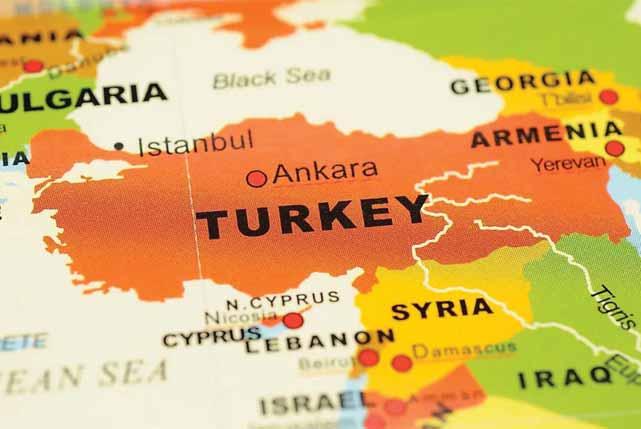
Clearly, we perfectly realize that talking about a large region in the context of this particular issue undoubtedly requires a very delicate approach: and not only in deeds but also in words. We will also be delicate and mention only a few "obvious" aspects. In particular, the following should be taken into account in the interests of regional security:
(a) Synchronization of Turkey's actions with the West, the course of the process, its prospects, objective and subjective circumstances;
b) Creation of additional guarantees of safe navigation in the waters of the Black Sea. It is doubtful that Turkey will announce its readiness to revise the Montreux Convention in the near future, but the war in Ukraine has revealed the need for "compensatory mechanisms" ensuring unrestricted navigation;
(c) Turkey's contribution to additional political and diplomatic opportunities for strengthening security of the Black Sea region.
To be continued.
GEORGIA TODAY JULY 28 - AUGUST 3, 2023 6 POLITICS
Legal Insights with Klein Law: Buying a Secondhand Flat in Georgia
This is the first Real Estate by Legal Columnist
Daniel Klein.
Next week’s Part 2 article will discuss buying an apartment in a new building and Part 3 will follow and focus on the basics of renting an apartment in Georgia.
Buying a flat in Georgia is quite simple and streamlined compared to most countries. Georgia has no shortage of properties for sale and, relative to almost any market in the region, every offer seems like a bargain-hunter’s paradise.
UNREGULATED REAL ESTATE BROKERS
Unlike most countries, there is no licensing board for RE brokers. In most countries, the RE Brokers are very strictly regulated, and anyone offering to sell a piece of real estate without a local license from the state (the US provides licenses on a state-by-state basis) or the countries’ licensing authorities could find themselves subject to fines and/or many years in prison: up to 5 years in the state of Florida, for example.
In Georgia, as there is no formal brokerage licensing system, anyone and everyone can be and seems to be a real estate agent. They are not bound by any laws of ethics and there is no realistic quick and inexpensive recourse for unscrupulous behavior. A visit to local brokerage sites is really a tell-tale of what the agency scene is like. If a search is made for, say, a particular unknown street in Tbilisi, there might be several offers with pictures and prices for properties
available. However, when the agent is called, the response can be, for example:
“I don’t know that street….there is no street with that name in Tbilisi.” When you inform that individual that they themselves put their name associated with a property on that street, they draw a blank, and again insist that such a street does not exist. It may require sending a screen shot from Google Maps to verify that such a street does indeed exist. Then sometimes when they realize the area you are interested in, they try to tell you that you don’t want to rent there because its supposedly noisy or dangerous, and they may then send a bunch of beautiful offers in a completely different region of the city. In most countries, a fake ad could result in a loss of license, fines etc., or charges of false advertising. There are indeed many valid, honest and fantastic brokers in Tbilisi, but it is important to have someone in the know to find them.
CONFLICT OF INTEREST OF REAL ESTATE BROKERS
Real estate brokers usually work for sellers and not buyers, meaning they are interested in a speedy commission (this is the case around the world); their company may even have monthly sales quotas. They also steer potential buyers to properties where they get the biggest percent of commissions (brokers everywhere usually share fees from 0% to 80% with other brokers; varying depending from offering to offering). When they represent sellers, they also sometimes act unscrupulously, since they try to get
the lowest price possible to get a speedy sale. At the end of the day, some (of course not all by any means) brokers are there only to make money without any interest in assisting the buyer with what they are looking for.
BAD LEGAL ADVICE OFFERED BY AGENTS
As speed and maximizing commissions is the priority for Agents, they often tell buyers that the broker will legally
58.1% of Online Transactions in Georgia Come from Gambling
advise them about the validity of title and the legal fitness of transfer documents. In order to speed the transaction along, Agents often discourage buyers from hiring their own lawyer, since they will try to persuade buyers that it is a waste of money and time (actually of the broker’s time). They might even try to give some oral guarantee that the everything is legally valid; even without having a legal background, which is usually the case. Any

third independent rep of the Buyer might be a spanner in the works which could delay the purchase; the last thing the Agent wants. Buyer beware! What if after the purchase there was a legal flaw? Not much recourse here. Suing in Georgia takes years. If the transaction is north of 100K USD and that amount of money is significant for the buyer, perhaps proper independent (non-biased) legal advice might be in order.
Green Energy and Yingli Solar Spearhead Renewable Energy Collaboration in Georgia
 BY MARIAM GORKHELASHVILI
BY MARIAM GORKHELASHVILI
On July 24, a significant milestone was achieved in Georgia’s renewable energy sector as the construction company “Green Energy” unveiled the largest 25MW solar power plant in Marneuli municipality. This ambitious project aimed to harness solar energy and contribute to the country’s sustainable development goals.
In light of this achievement, the executive director of “Yingli Solar,” one of China’s most prominent solar panel manufacturers, visited Georgia on a business visit. Accompanied by colleagues, the delegation held meetings with key representatives from various energy organizations, including the Energy Development Fund of Georgia and the State Electricity System of Georgia.
BY MARIAM GORKHELASHVILI
Astudy conducted by ISET and PMC has shed light on the significant share of gambling transactions in Georgia’s e-commerce sector. The research, analyzing data from 2021-2022, reveals that gambling accounted for a staggering 58.1% of online

transactions, amounting to 3.7 billion GEL out of the total 6.5 billion GEL in internet payments.
However, these figures signify a noteworthy reduction. Following the approval of new gambling restrictions by the Parliament of Georgia in December 2021, the gambling industry experienced a downturn. On an annual basis, the number of transactions declined by 14.5%, while the total value of transactions decreased by 9.6%. Consequently, the
share of gambling transactions in total e-commerce dropped from 70.5% in 2021 to 58.1% in 2022.
Despite this decline in the share of gambling transactions, it is important to recognize that the industry exhibited clear growth in e-commerce during this period. The changing landscape of Georgia’s e-commerce indicates a shift away from a heavily gambling-focused market, making room for other sectors to flourish.
The purpose of these meetings was to explore potential partnerships and discuss innovative approaches to advancing renewable energy technologies in the region. The delegation also had an upcoming meeting scheduled with “Huawei,” signifying a commitment to collaborating with leading technology companies in the field.
“Yingli Solar” boasts a remarkable track record with 20 years of global recognition in the solar industry. Their marketing network spans over 20 countries and regions, reflecting their strong international presence. With more than 30 GW of PV modules deployed, “Yingli Solar” has been a consistent supplier of green energy solutions to customers across the globe. Their extensive reach includes
countries such as Germany, Spain, Italy, Greece, France, South Korea, Japan, Brazil, South Africa, Mexico, and the United States.
The company’s 10 branches worldwide demonstrate its dedication to establishing a strong global footprint in the solar energy sector.
This collaboration between “Green Energy” and “Yingli Solar” signifies a promising step towards accelerating renewable energy adoption in Georgia. With “Green Energy” leading the charge in solar panel design and installation, and “Yingli Solar” contributing its expertise and vast experience, the partnership is poised to bring about positive environmental impacts in the region. The joint efforts of these two companies are anticipated to contribute significantly to Georgia’s clean energy transition and play a pivotal role in combatting climate change on a global scale.
GEORGIA TODAY JULY 28 AUGUST 3, 2023 7 BUSINESS
Demand Exceeded All Expectations –
“Tsavkisi Panorama” Project is Being Completed One Year Earlier
We were right, and potential customers did want to live in the eco-friendly infrastructure and safe area, away from urban pollution. So, to satisfy their needs and wishes, we offered our customers Western practices and high standards.”
WE KNOW THAT TSAVKIS PANORAMA IS ONE OF THE MOST SOUGHT-AFTER RESIDENTIAL AREAS ON THE MARKET. TO GO INTO MORE DETAIL, WHAT IS THE UNIQUE PRODUCT YOU OFFER CUSTOMERS, AND WHY IS THIS PROJECT HIGH IN DEMAND?

”Tsavkis panorama is exceptional in many ways. It has a convenient location. It is located seven minutes from the city center and is an ideal residence for those who work in the city but want to live away from the urban environment. The project has panoramic views and a forest behind it. Therefore, there is no
it has become one of the most soughtafter residential areas. ” said Gegi Vasadze.
IT IS KNOWN THAT YOUR PROJECT WILL BE COMPLETED A YEAR AHEAD OF SCHEDULE. TELL US THE REASON FOR ALL THIS, AND DID YOU EXPECT THIS SUCCESS?
“The project’s early completion is directly related to the high demand of customers. One year ago, we started sales of “Tsavkisi Panorama” in May 2022. The completion of the project was planned for the end of 2024, and accordingly, at the beginning of the project, we had a sales plan for two years. Of course, we expected that customers would choose our project, and we were expecting success. However, the demand exceeded all expectations, and most land plots have been sold already. We took on the challenges of high demand, and our team
Tsavkisi Panorama is a residential estate that adapts to modern standards, and its concept fully meets the needs of people with a modern lifestyle, for whom environmental conditions, well-equipped infrastructure, safety, and a comfortable living environment are vital.

The Tsavkisi Panorama team success-
fully created a unique residential area in the existing market by offering its customers a new standard of the ideal life. To gain more information about the company and its succession, Georgia Today interviewed managing partner Gegi Vasadze.
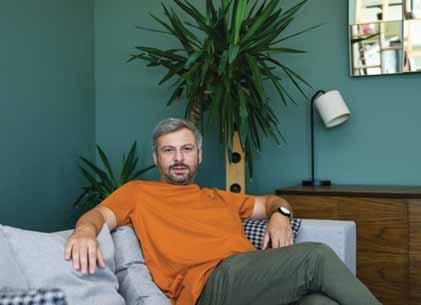
“Project “Tsavkisi Panorama” started one year ago with a 30 million investment value. From the beginning, we had
the desire and ambition to occupy a unique niche and meet modern people’s demands as much as possible. While working on the previous project, “Tsavkisi Valley,” we knew that soon living in a healthy territory outside the city would be in demand. And before we started planning this project, we conducted research in advance to accurately study the customer’s requirements and wishes.
Feel the PAWer of Love: EU-Supported Pet Festival Takes Place in Zugdidi

Dogs and cats are our loyal companions, deserving of love and care, not a life on the streets. UNDP’s partner organization "Animal Project," has been tirelessly working all across Georgia to advocate for the protection of stray animals.
On July 20, the town of Zugdidi hosted a heartwarming festival #FeelThePAWerOfLove that united the community under a common cause: showing love and support for our furry friends. The event brought together a diverse group
of attendees, including UNDP Deputy Resident Representative in Georgia Anna Chernyshova, along with local civil society organizations, volunteers, and Zugdidi residents.
The festival participants engaged in meaningful discussions about responsible pet ownership. They emphasized the importance of adopting pets from shelters or the streets, giving them a second chance at a loving home. They also highlighted the significance of regular veterinary care, neutering, and vaccinating to ensure the well-being of our four-
legged companions.
The event also shed light on the challenges faced by communities living alongside administrative boundary lines, where conflict-affected individuals are already grappling with economic and social hardships. The growing population of stray animals only adds to their burden, making it crucial for us all to come together and take action.
The festival was supported by the European Union and UNDP as part of our joint #EU4Dialogue program. Join us in making a difference, one paw at a time!
risk that someone will build another project near this place.
Our territory makes up 13 hectares, with 98 individual plots of land supplied with all communications. We provided 15,000 square meters of recreation area, a tennis court, basketball and football fields, a skatepark, and a bicycle path. We have planned a one-kilometer footpath, children’s entertainment spaces divided by age, and many other exciting and necessary infrastructural projects. We preserved the recreational nature, harmoniously developed the area, and integrated it with the existing environment. We created safe, restful, and ecofriendly infrastructure. We wanted to allow our customers to live comfortably in separate living areas.
Considering all this, “Tsavkisi Panorama” is a truly outstanding project, so
completed two years of work in one year. We are proud that the “Tsavkisi Panorama” project will be finished one year earlier successfully,” informs Gegi Vasadze.
DID THE SUCCESS OF THE TSAVKISI PANORAMA INSPIRE YOUR PLANS FOR THE FUTURE?
The success of Tsavkisi Panorama has given us more motivation and inspiration to create similar concept residences and create an environmentally sustainable, safe, and comfortable living space for others. We are working on a new project, creating a new type of settlement in Tsavkisi with an investment value of 40 million. The construction of this new project is planned to start in the summer. We will inform the public of the other details soon,” says Gegi Vasadze.
GEORGIA TODAY JULY 28 - AUGUST 3, 2023 8 SOCIETY
Photo by Gela Bedianashvili/ UNDP
SABUKO: Saving Unique Endangered Species in Kakheti

In the picturesque region of Kakheti, Georgia, lies a landscape teeming with biodiversity and unique ecological treasures. However, this natural haven faces a significant challenge - the delicate balance between maintaining a living landscape and the looming threat of desertification. Recognizing the urgency of the situation, the Kakheti Steppes project, implemented by BirdLife partner SABUKO, in collaboration with local communities, is diligently working to protect biodiversity and conserve local species.
RESTORING GALLERY FOREST AND GRASSLANDS

Building upon the successes of the previously funded "Restoring Gallery Forest and Grasslands in the Iori River Valley" project, the Kakheti Steppes project places a strong emphasis on the restoration of wildlife habitats and fostering collaboration with the pastoralist community. By reviving gallery forests and grasslands, critical habitats for focal species are rejuvenated, supporting their populations and ecological functions. Through thoughtful restoration initiatives, such as reforestation and habitat management, the project aims to pre-
serve the rich biodiversity that thrives in these unique landscapes.
The first stage of the project covered the Chachuna Managed Reserve located in Georgia’s Dedoplistskaro municipality, which has faced a severe problem of degradation due to unregulated grazing, while the second phase covers Chachuna, Kotsakhura Range, Samukhi Valley and Vashlovani Protected Area, covering a territory of 25,000 ha in total.
The studies conducted on the spot in terms of biodiversity show that as a result of various measures implemented by SABUKO, such as the arrangement of fences to prevent the chaotic sheep movement and grazing, and installation of a gabion on the river, new plants characteristic to the floodplain forest have appeared and the area of the floodplain forest has expanded.
In the end, taking such measures can lead to partial restoration of unique floodplain forests on the ground and thus save the homes of local biodiversity, including rare species of animals and birds included on the Red List.
It is clear that through such measures and gabion, the situation has been significantly improved in terms of species restoration. As such, hydrologists and
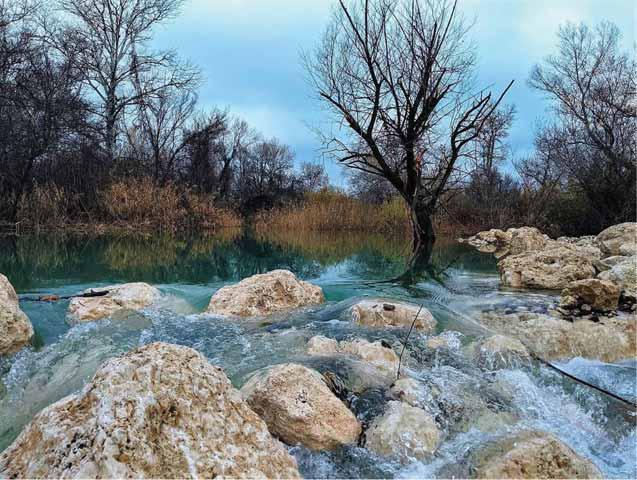
ichthyologists working on the ground claim that the amount of fish in the river, as well as other local species, has increased, which is thanks to the gabion. The first gabion arranged on the spot was a pilot project, and as it turned out to be successful. Now it is planned to arrange additional gabions for better results.
The gabion regulates water flow and supplies the algae and vegetation there with the water it needs. The gabion also reduced erosive processes and the washing away of the river banks around it through its regulatory function.
The Kakheti Steppes project also places special emphasis on the conservation of species such as the Imperial Eagle and Vulture. Through targeted conservation measures, including habitat restoration and the development of management plans, the project aims to safeguard the sites for these raptors. Additionally, the project employs advanced monitoring techniques such as bird ringing - the attachment of a small, individually numbered metal or plastic tag to the leg or wing of a wild bird to enable individual identification. This helps in keeping track of the movements of the bird and its life history - and uses photo traps to gather valuable data on species populations,
behavior, and movement patterns.
In the future, the SABUKO team plans to also ring mammals. Currently, they are being monitored through GPS and photo traps.
SUSTAINABLE GRAZING AND ROTATIONAL GRAZING SCHEMES
Central to the project's objectives is the promotion of sustainable grazing practices and the implementation of rotational grazing schemes. By carefully managing grazing activities across the steppes, the project ensures that the delicate balance between biodiversity conservation and the livelihoods of pastoralist communities is maintained. These efforts not only protect focal species but also contribute to the restoration of grassland biodiversity and the replenishment of soil carbon stocks. By involving farmers in the design and implementation of grazing schemes, the project fosters a sense of ownership and active participation in biodiversity conservation.
MITIGATING HUMANWILDLIFE CONFLICT AND PROMOTING COEXISTENCE
One of the critical challenges in conserving focal species is addressing humanwildlife conflict (HWC). The Kakheti Steppes project recognizes the importance of engaging local communities in understanding the ecological importance of focal species and finding ways to mitigate conflicts. By conducting surveys and assessments, the project identifies strategies to reduce HWC, such as implementing innovative solutions and raising awareness about the ecological benefits
of coexistence. Through these measures, the project strives to create a harmonious balance between human activities and the conservation of focal species.
EXPANDING PROTECTED AREAS AND ADVOCATING FOR POLICY CHANGE

Recognizing the significance of protected areas in preserving biodiversity, the project works diligently to expand the network of protected areas and ensure ecological corridors. By preparing the comprehensive management plans of Samukhi PA and Dedoplistskaro Bioreserve, the project aims to secure the long-term conservation of focal species and their habitats. Moreover, through active engagement with policymakers and advocacy efforts, the project seeks to influence positive policy changes that support biodiversity conservation and the sustainable management of natural resources.
The Kakheti Steppes project is an example of dedicated efforts to protect biodiversity and conserve focal species in the face of environmental challenges. By restoring gallery forests and grasslands, promoting sustainable grazing practices, mitigating human-wildlife conflict, expanding protected areas, and advocating for policy change, the project embodies a holistic approach to conservation. With the generous support of Arcadia and the management expertise of Cambridge Conservation Initiative, the project brings together science, local knowledge, and community participation to safeguard the fragile balance between a living landscape and the looming threat of desertification.
GEORGIA TODAY JULY 28 AUGUST 3, 2023 9 SOCIETY
Nest of Black vulture - Giorgi Ianqoshvili
Systematic Land Registration Explained
BY NAPR
WHAT DOES “SYSTEMATIC LAND REGISTRATION” MEAN?
Systematic land registration is a process during which the government, on its own initiative, systematically surveys land plots in specific geographic areas, collects the relevant documents and registers land titles.
Systematic land registration is free for all citizens.
According to the order of the Minister of Justice of Georgia, 59 municipalities of Georgia were defined as the geographical areas for systematic registration, and the systematic registrations of these areas will be completed by the end of 2024.
HOW IS THE REFORM PROGRESSING AT THIS STAGE?
Systematic land registration is being carried out successfully and at a high pace throughout the country. During the working day, about 2500 land plots are measured and a similar number are registered. Since January 1, 2022, more than 408,000 land plots have been measured, of which ownership rights have already been registered for more than 330,000 land plots. Within the framework of systematic land registration reform, field/ survey works have been completed in Abasha, Kaspi, Samtredia, Senaki and Lagodekhi municipalities.
WHO IS THE REFORM FOR? WHO CAN BENEFIT FROM THE REFORM?
Within the framework of systematic registration private, state or municipally owned land plots will be fully surveyed and registered, unified database will be created. Those persons who could not register the right of ownership due to lack of proper documents on land plots, gaps in documents, neighborhood disputes, lack of fees required for cadastral planning/surveying drawing or other reasons, will be able to become owners of land plots in their possession without leaving their place of residence, free of charge, easily, without financial and bureaucratic barriers. Land plot survey, collection and systematization of registration documents, verification of signatures of the parties to transaction, recognition of ownership rights to land plots, ascertainment of facts, registration of ownership rights and changes in it are performed free of charge (without compensation).
WITH WHAT RESOURCE DOES THE NATIONAL AGENCY OF PUBLIC REGISTRY CARRY OUT THE REFORM?
The National Agency of Public Registry has gradually retrained and employed hundreds of employees since 2022. Today, 660 certified surveyors and 262 registrars are involved in the work.
Systematic land registration is a landmark and of fundamental importance for our country. Land plots transferred to the population with incomplete documentation in the 1990s are being registered, survey drawings created with inaccurate tools in the 2000s are being corrected, and the boundaries of the land plots registered on the basis of “whoever gets first“ are being corrected.
Success of the reform is determined by a properly planned process, detailed analysis of the work carried out in advance on the pilot areas, gradually increased scope, trained, certified and qualified employees, an appropriate number of off-road vehicles, the latest and the highest precision surveying tools.
HAS A REFORM OF SUCH A SCALE BEEN CARRIED OUT SO FAR THAT WOULD FIX THE PROBLEMS OF THE LAND MARKET?
For years, the National Agency of Public Registry has had to deal with the systematic errors made in the process of transferring lands to the population in the 1990s and the results of the "system-
atic registration" conducted in 1999-2003, which were unprepared and adjusted to the political agenda, resulting in substantial violations.
The results were so poor and inaccurate that no one signed the deliveryacceptance acts drawn up by the state for the purpose of handing over the works. Additionally, during the elections in the summer of 2012, within a few days, the computer program allegedly registered up to 500,000 land plots, which were completely out of touch with reality and were subsequently canceled by the population themselves over the years. It was the unfilled documents in the 1990s, the “systematic registration” conducted with fundamental violations in 1999-2003, the registration rule based on the “first come-first served” principle in the 2000s, and up to half a million copies printed for no reason in the summer of 2012 that accumulated the problems of overlap between the cadastral borders of land plots. As part of the current systematic registration reform, unregistered land plots are being surveyed and registered, as well as the cadastral data and boundaries of 60% of the previously registered land plots are corrected.
FROM THE EXPERIENCE OF THE PAST, WHAT HAS CHANGED TODAY DURING THE CURRENT REFORM?
As a result of the strengthening of the National Agency of Public Registry and the Justice system as state institutions,
the current reform is carried out with the best technology in the world. An electronic minutes application has been created and surveyors have tables in the field. The surveyors show the residents the shape of the land plot, area, layout of the neighboring lands, and only after that the final decision is made and the survey drawing approved by the owner is uploaded to the database. Electronic programs have significantly reduced the registration time. Just one year ago, it was necessary to first measure the land plot, then process the cadastral data by a specialist in the office and prepare a survey drawing. If it turned out that the boundaries of the surveyed land plot overlapped with the registered data of another land plot, it was necessary to repeat the surveying works.
After gaining independence, Georgia, for the first time, managed to create a project, prepare both a technical and legal base, train employees, analyze the challenges in all regions of the country and only then start field/survey work directly.

The need for systematic land registration had been highlighted in the National Agency of Public Registry for two decades, but it was not possible to start the work. Only at the beginning of 2022, with the initiative and efforts of the Minister of Justice, Rati Bregadze, with the support of the Prime Minister of Georgia, it was possible to make this most important decision and mobilize the relevant funds from the Georgian budget. It was
the first time that the systematic registration reform was started in a manner and form focused on the interests of the population, and the work was not connected to the issue of elections and the political agenda for the first time.
The high activity of the population, professionalism and conscientious attitude of the National Agency of Public Registry employees, high quality surveying tools and proper software, are the main reasons that by the end of 2024, all land plots in Georgia will be surveyed and registered in the National Agency of Public Registry.
Systematic registration has a significant economic effect. It contributes to the protection of land ownership, effective land management, stable, healthy and reliable civil turnover, development of the agricultural sector and agribusiness, landowner is given the opportunity to attract investments, develop infrastructure, which is ultimately the basis of the country’s economic progress.
IN ADDITION TO THE SYSTEMATIC LAND REGISTRATION, THE NATIONAL AGENCY OF PUBLIC REGISTRY IS ALSO IMPLEMENTING THE ADDRESSING REFORM/PROJECT.
According to the data of January 1, 2022, 70% of populated areas of Georgia were without addresses. Municipal and village boundaries were not specified and established. The response reform to this challenge started in 2022, and after its completion, the address register of Georgia will be complete.
At the end of 2023, a map of all municipalities, excluding the occupied territories, will be submitted to the Parliament of Georgia, detailing the borders of municipalities and villages. After the boundaries are established, the National Agency of Public Registry is ready to begin the formation of addresses, which involves the formation and numbering of streets in municipalities and villages. From the beginning of the reform until today, the boundaries of 60 municipalities and 3,692 were worked out, and relevant cartographic data were created. In 2,485 villages where streets were never formed, 45,692 street, lane and alley maps were created. By September of this year, all streets of all municipalities will be formed. Providing an address will be simplified and it will be in full compliance with international addressing standards.
After the completion of the reform, we will have a perfect navigation system in Georgia, on which the road network, real estate and lands will be given with the corresponding addresses. This will significantly improve the delivery of government services, including emergency care.
Katie Melua Joins Sadagi Cleanup in Kiketi

Road and a ravine starting at a nearby garbage collection point.
Initially, modest amounts of garbage were spotted, so our group moved towards the ravine. Such areas (khevi) are notorious throughout Georgia (around the world as well) as handy dumpsites for people with no thought as to the consequences of their thoughtlessness.
Suddenly, the mother lode of the afternoon was discovered: large quantities of old asphalt roofing material and other construction waste were spotted dumped high up on the steep slopes of this ravine. So much garbage was there that more hands were needed to deal with the mess.
As white blood cells converge to attack an infection, several members of our group converged on this spot and, working together, quickly eliminated the contamination.
This small but special mini clean-up is the 33rd such action by SADAGI volunteers. It was all the more meaningful in that Nikoloz Shurgaia, the founder of SADAGI, and his wife Eka were joined by Katie Melua, a long-time SADAGI supporter, together with her family and several friends from London. We thank
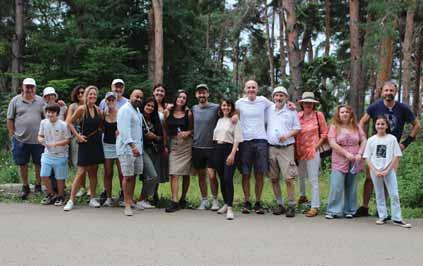
all those who took of their time to participate. The process itself may not be glamorous, but the camaraderie is great and the long-term results should be. The very young who joined in will hopefully grow up following the example that SADAGI volunteers set as well as encour-
aging others. Even casual onlookers and passersby could not help but be affected by this idea!
If you would like to join us, please sign up at www.sadagi.ge. If you have any questions, feel free to contact info@ sadagi.ge
GEORGIA TODAY JULY 28 - AUGUST 3, 2023 10 SOCIETY
BLOG BY PAUL RODZIANKO
Driving up to Kiketi from Tbilisi for the cleanup on a sweltering Sunday afternoon, very little garbage was visible along the road-
side. Was this SADAGI cleanup going to be more like an Easter egg hunt, where each item found would feel like a prize? Did pockets of refuse really exist in this beautiful hilly setting?
Twenty-five stalwarts of all ages from as far away as London and Washington DC joined together to patrol the forested area running along Galaktion
Tabidze
For Want of a Nail
and saw them, of course I booted up and took off out there on the double, stick in hand, having made sure in advance that there was an exit for them all. Yes, so I charged them in fury, getting only a whack or two in before they retreated. Prop up the gate, and consider how to mend it.
Two oak posts with sharpened ends would need to be put in the ground, one from which the long gate would hinge, the other to which its other end and the meeting end of the short gate would be fixed with wire loops when not in use. But this is an especially rocky area, and I mean some specimens too large for me to lift. One, in particular, I want to dig up, as it sticks out and gives truck and car drivers a fright when they want to enter by this way. I began digging around it with a straight bar to gauge its size and depth in the ground.
Do you know that rhyme?
“For want of a nail the shoe was lost.
For want of a shoe the horse was lost.
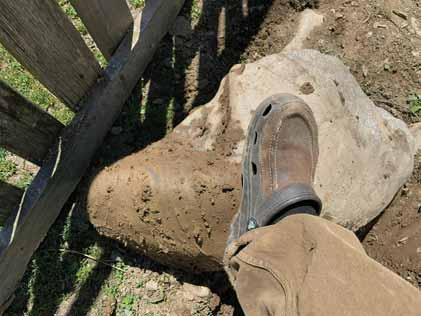
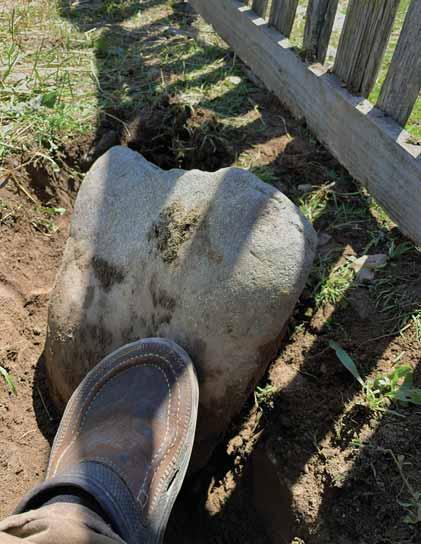
For want of a horse the rider was lost.
For want of a rider the message was lost.
For want of a message the battle was lost.
For want of a battle the kingdom was lost.
And all for the want of a horseshoe nail.”
It’s a nursery rhyme possibly connected to the Battle of Bosworth in 1485, during which Britain’s King Richard III lost his life. I could relate somewhat to the chain of events, though on a far humbler scale, as I began the onerous task of repairing the long back gate to our Etseri village property, near the barn.
This gate had withstood a few winters, but with recent comings and goings of what in Britain is called “heavy plant” and in North America something more like “large machinery” (in this case, trucks and a digger) had taken its toll. Once the departing workers left it open,
CULTURE
or more correctly fallen over, and cows began wandering in to sample our backyard’s magnificent foliage, all without making a sound. I was in the bedroom at the time of their incursion, with the window open, and heard not a sound; they didn’t moo even once to give themselves away, the sneaky creatures. Guilty conscience? When my wife looked out
UNESCO Strongly Condemns Repeated Attacks on Cultural Heritage
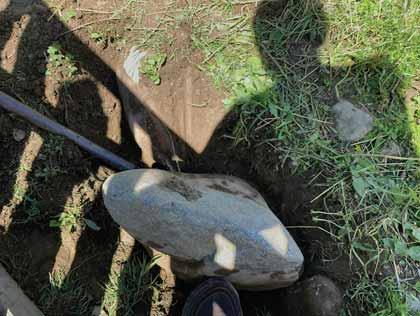
UNESCO is deeply dismayed and condemns in the strongest terms the attack carried out by the Russian forces, which hit several cultural sites in the city centre of Odesa, home to the World Heritage property – The Historic Centre of Odesa, the organization tweeted echoing the damage of a historic Ukrainian cathedral in the Russian strikes.

Audrey Azoulay, UNESCO DirectorGeneral, urged Russia to comply with its international-taken obligations.
“This outrageous destruction marks an escalation of violence against the cultural heritage of Ukraine. I strongly condemn this attack against culture, and I urge the Russian Federation to take meaningful
action to comply with its obligations under international law, including the 1954 Hague Convention for the Protection of Cultural Property in the Event of Armed Conflict and the 1972 World Heritage Convention,” she said.
The attack on the historic Ukrainian cathedral on July 23 took the lives of at least two people, according to preliminary reports, and damaged several significant cultural sites, including the Transfiguration Cathedral, the first and foremost Orthodox church in Odesa founded in 1794.
This act of hostility came only days after other attacks that impacted many cultural heritage sites in areas protected under the World Heritage Convention in Lviv and Odesa.
PUBLISHER & GM
George Sharashidze
COMMERCIAL DEPARTMENT
Commercial Director: Iva Merabishvili
Marketing Manager: Natalia Chikvaidze
EDITORIAL DEPARTMENT:
Editor-In-Chief: Katie Ruth Davies
Turned out there were more than 10 other rocks helping to keep that prize in place, and it was also nice and deep. But it had to go, so I rolled up my sleeves and continued digging and prying. Rock after rock came out around it. It would budge an inch or so with all my weight on the bar (one of the ancient classical Basic Machines, I remembered from school: the lever). I dug out all the free earth around it to ease its passage into daylight, but it was really putting up a fight.
I next poured water in all around to soften and lubricate the sticky, clayey soil, realizing that friction as well as the monster’s own weight was holding it down. Eventually, I borrowed a neighbor’s second bar, then the neighbor himself for leverage, and only by this method did we manage to wrest it from its home of decades or centuries. Then it was simply a matter of rolling it away down the slight slope the outside road offered, as it was too heavy for me to lift.
I had similar battles to dig the hole for the first oak post: rocks everywhere, for all I knew leading straight to the earth’s core if I would persist. Finally, the hole was deep enough to sink the pointed end of the post into, then shovel that soil back around it; wet it down a bit; then stamp and tamp it down all around as hard as I could. When dry, this soil is
almost like cement, so the post should hold fast in place. Whew!
Now, my arms and hands are all seized up from the effort, so tomorrow I’ll continue with the other post, then wire-hinge the long gate to it, and we’ll really have something. As long as it lasts, anyway: ultimately we need steel posts cemented into the ground for the long-term. But for now, it’ll keep the cows out, which is enough. Those rocks, though, almost broke me.
Tony Hanmer has lived in Georgia since 1999, in Svaneti since 2007, and been a weekly writer and photographer for GT since early 2011. He runs the “Svaneti Renaissance” Facebook group, now with over 2000 members, at www.facebook.com/groups/ SvanetiRenaissance/
He and his wife also run their own guest house in Etseri: www.facebook.com/hanmer.house.svaneti
Journalists: Ana Dumbadze, Vazha Tavberidze, Tony Hanmer, Emil Avdaliani, Nugzar B. Ruhadze, Michael Godwin, Mariam Gorkhelashvili, Mariam Mtivlishvili, Erekle Poladishvili
Photographer: Aleksei Serov
Website Editor: Katie Ruth Davies
Layout: Misha Mchedlishvili
Webmaster: Sergey Gevenov
Circulation Managers: David Kerdikashvili, David Djandjgava
ADDRESS 1 Melikishvili Str.
Tbilisi, 0179, Georgia
Tel.: +995 32 229 59 19
E: info@georgiatoday.ge
F: GeorgiaToday
ADVERTISING & SUBSCRIPTION
+995 555 00 14 46
E-mail: marketing@georgiatoday.ge
Reproducing material, photos and advertisements without prior editorial permission is strictly forbidden. The author is responsible for all material. Rights of authors are preserved. The newspaper is registered in Mtatsminda district court.
Reg. # 06/4-309
GEORGIA TODAY JULY 28 AUGUST 3, 2023 11 SOCIETY GEORGIA TODAY
BLOG BY TONY HANMER
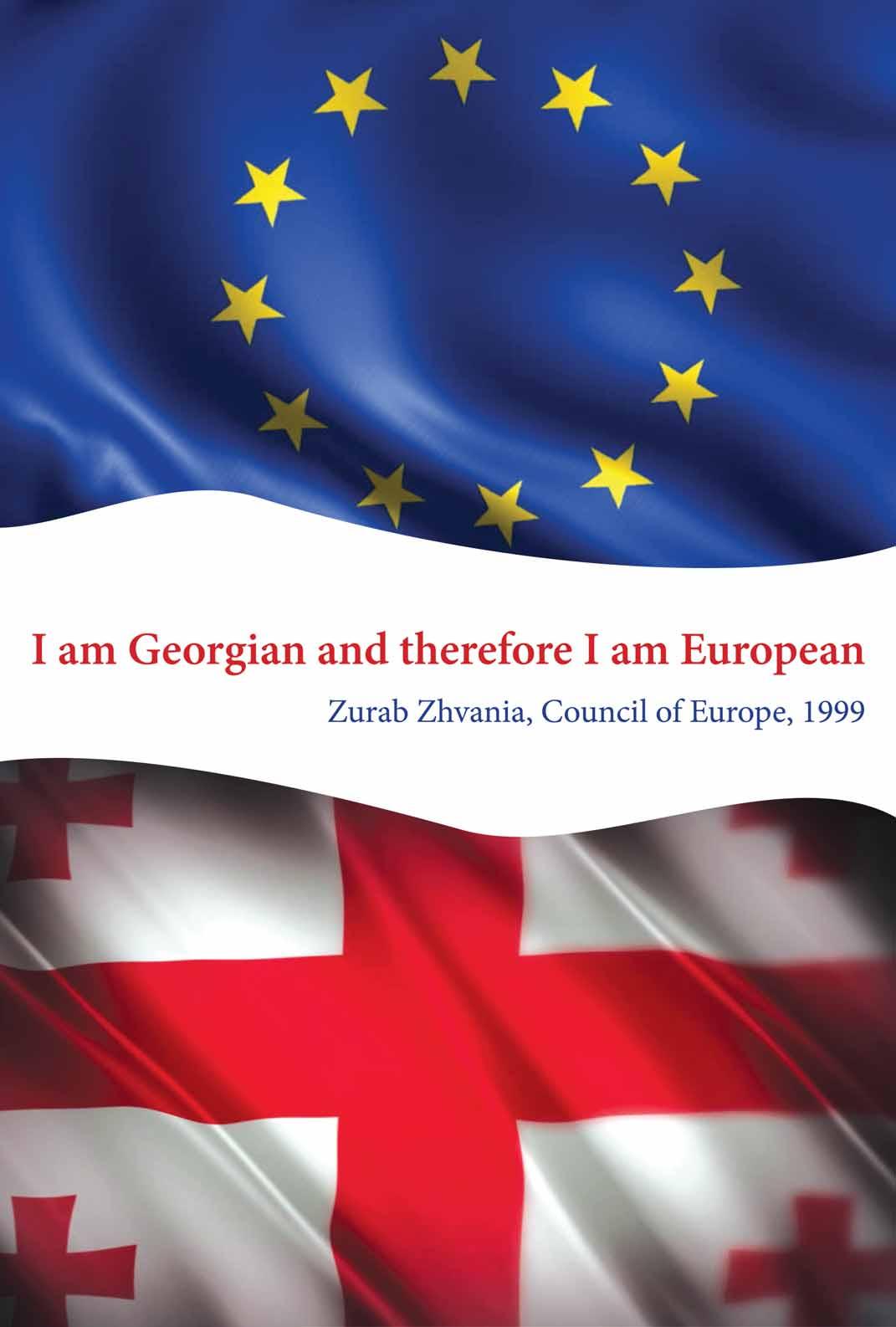









 BY MARIAM GORKHELASHVILI
BY MARIAM GORKHELASHVILI





 BY MARIAM GORKHELASHVILI
BY MARIAM GORKHELASHVILI
















